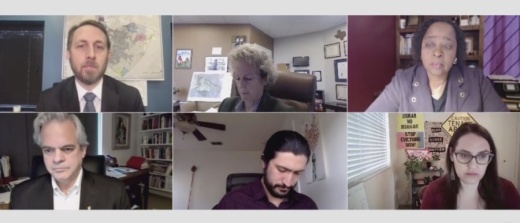The moratorium blocks evictions for most tenants who are struggling to pay rent, including those whose rent is less than $2,475 a month. Landlords still have the right to evict tenants for other causes, such as threat of harm or engaging in criminal activity on the premises.
“This is the most effective means to promote public health and economic welfare during this ongoing global pandemic, both because keeping people inside and housed curbs the spread of the virus and because ensuring housing stability contributes to job retention—and it strengthens local economies,” Travis County Judge Andy Brown said at a Jan. 28 news conference.
Both entities have received new funds through the Federal Emergency Rental Assistance Program to help renters that have fallen behind on rent due to coronavirus-related challenges, with $10.7 million going to Travis County and nearly $29.6 million going to the city. From now until April, the city and county will work to help struggling renters with current payments and back rent and will also coordinate with landlords, city and county officials said.
“When, eventually, the moratoriums do lapse, at some point, we don’t want renters to be evicted because they have lots of back rent, and we don’t want property owners saddled with mortgages they can’t pay,” Austin City Council Member Greg Casar said.
However, Travis County’s newest commissioner, Ann Howard, who recently pushed for the creation of the county’s new subcommittee on homelessness and housing issues, said the collective $40 million dollars would not be enough to meet the community’s need in full.
“We're working really hard together to make this money work and to show us how future dollars can also best be spent to keep people home, to keep them safe and to keep the economy going,” Howard said.
Officials have yet to confirm a date when they will begin distributing the new rental assistance funds.
The local moratoriums align with a federal eviction ban President Joe Biden extended through March 31 with an executive action shortly after his inauguration. Casar praised Biden’s administration for the move but said local action was also necessary to ensure a ban on evictions is enforced.
“The federal moratorium is not enough,” he said. “The only way this works is when the local governments are distributing rental assistance, the local governments are extending eviction moratoriums and the federal government is doing its part on those two things as well.”





